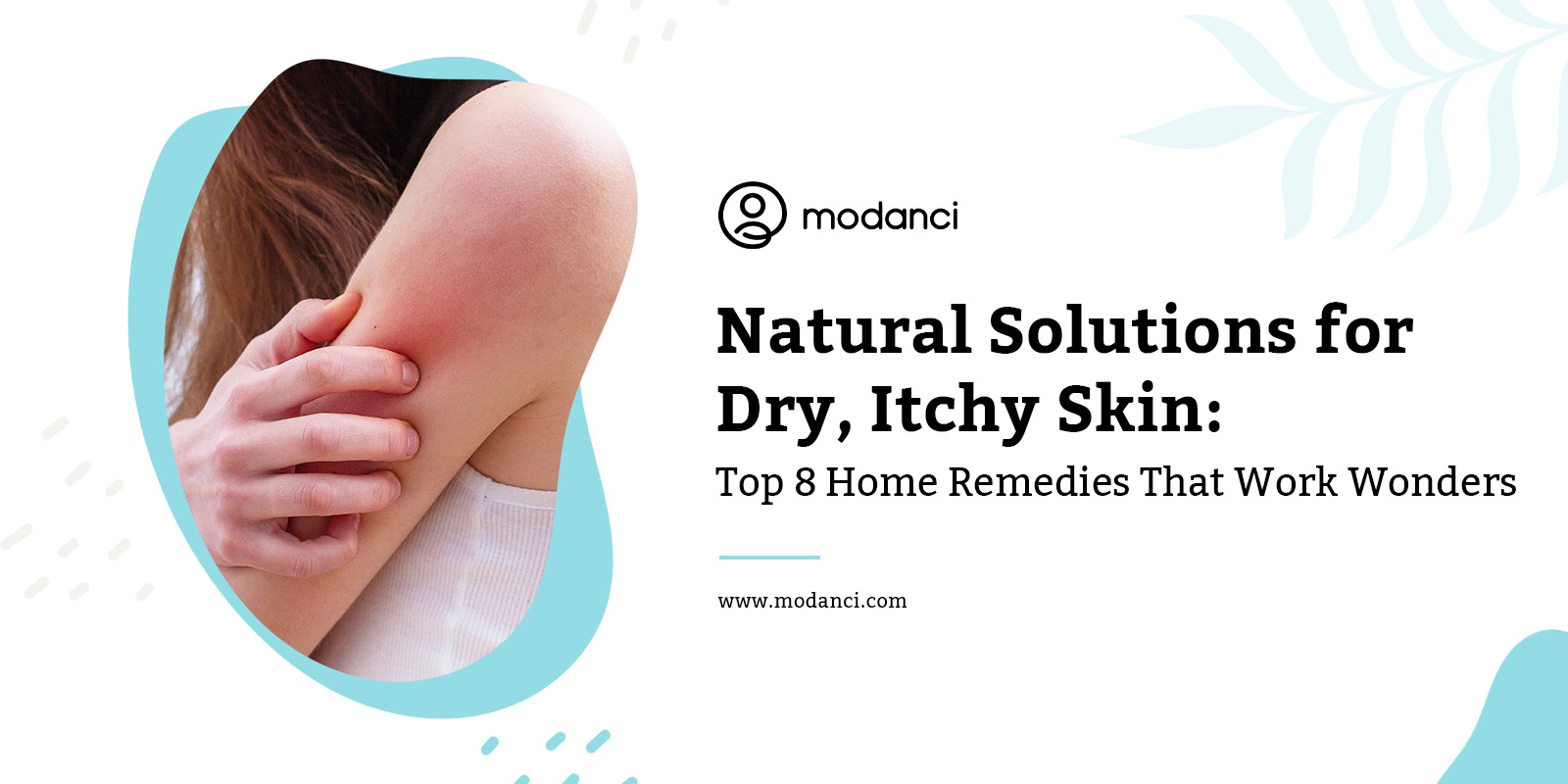Dry, itchy skin can be uncomfortable and frustrating, especially when it disrupts your daily routine. While many commercial skincare products are available, they often contain harsh chemicals that can exacerbate the problem. The good news is that nature provides plenty of safe and effective remedies to soothe and nourish dry, itchy skin.
In this article, we’ll explore the top 8 home remedies that work wonders for this common issue, helping you achieve healthy, glowing skin without harmful side effects.
What is Dry and Itchy Skin?
Dry and itchy skin is common when the skin loses its natural moisture and becomes dehydrated, leading to flakiness, irritation, and a persistent urge to scratch.
This condition can affect people of all ages and skin types. Various factors such as weather changes, harsh soaps or skincare products, hot showers or baths, and underlying health conditions can cause it. In some cases, dry and itchy skin can be a symptom of a more serious underlying condition, such as eczema or psoriasis.
Top 8 Home Remedies for Dry and Itchy Skin
Many over-the-counter products are available to help soothe and moisturise your skin. However, they can be expensive and contain harsh chemicals that can worsen the problem. The good news is that you don’t have to break the bank or expose your skin to harmful ingredients to find relief.
Here are the top eight natural home remedies to soothe your dry and itchy skin:
1. Coconut Oil
Coconut oil contains fatty acids that can help improve skin hydration by trapping moisture, making it feel soft and smooth. It has antimicrobial properties that can help protect the skin from harmful bacteria and fungi that can cause infections and irritations. It’s also rich in antioxidants, which can help reduce oxidative stress on the skin and prevent premature ageing.
Apply a small amount of coconut oil to the affected area and massage gently into the skin. It can be used as a daily moisturiser or as needed to relieve itching and irritation. However, it’s important to note that coconut oil may not be suitable for all skin types, particularly those with acne-prone or oily skin, as it can be comedogenic and clog pores.
2. Oatmeal
Oatmeal contains anti-inflammatory and antioxidant properties that can help reduce skin irritation, redness, and inflammation. It contains natural saponins that act as gentle cleansers, making it an ideal ingredient for sensitive skin. It is also a natural skin cleanser, which can help remove dead skin cells and impurities from the skin, leaving it feeling soft and smooth.
Mix a cup of finely ground oatmeal with warm water to create a paste. Apply the paste to the affected area and leave it on for 15-20 minutes before rinsing off with warm water. Alternatively, add oatmeal to a warm bath to soothe and moisturise the entire body. Using plain, unsweetened oatmeal is important, as flavoured varieties may contain additives that could irritate the skin.
3. Honey
Honey is a natural humectant, which means it helps to attract and retain moisture in the skin. It has anti-inflammatory and antibacterial properties that can help reduce skin inflammation and prevent infections.
Apply a thin layer of raw, organic honey directly to the affected area. Leave it on for 15-20 minutes before rinsing with warm water. You can also mix honey with other natural ingredients, such as coconut oil or oatmeal, to create a moisturising and nourishing face or body mask. It’s best to use raw, unprocessed honey, as processed honey may not have the same skin benefits.
4. Jojoba Oil
Jojoba oil is similar in composition to the natural oils produced by the skin, which makes it an effective moisturiser for dry and itchy skin. It is easily absorbed by the skin without leaving a greasy residue, making it suitable for all skin types. Additionally, jojoba oil has anti-inflammatory properties that can help reduce skin inflammation and irritation. It also contains antioxidants, such as vitamin E, that can help protect the skin from damage caused by free radicals.
Apply a few drops of the oil directly to the affected area and massage gently into the skin. You can also mix jojoba oil with other natural ingredients, such as lavender oil or aloe vera gel, to create a moisturising and soothing face or body lotion.
5. Aloe Vera
The gel-like substance inside the leaves of the aloe vera plant is rich in vitamins, minerals, and antioxidants, making it a popular natural remedy for a wide range of skin conditions. Aloe vera has moisturising and anti-inflammatory properties that help soothe dry, itchy skin. It is rich in antioxidants such as vitamins A, C, and E, which can help protect the skin from damage caused by free radicals. Its antibacterial and antifungal properties effectively treat minor cuts, scrapes, and other skin infections.
Apply the aloe vera gel directly to the affected area. You can also mix it with other natural ingredients, such as coconut or jojoba oil, to create a moisturising lotion.
6. Chamomile Tea
Chamomile tea is a herbal infusion made from the dried flowers of the chamomile plant. It contains anti-inflammatory, antioxidant, and soothing compounds that can help alleviate skin irritation, redness, and itchiness.
Chamomile tea can be applied topically to the affected areas of the skin or used as a compress. It can also be ingested for its overall calming and relaxing effects, which may indirectly benefit the skin by reducing stress and promoting better sleep. Brew a strong cup of chamomile tea, let it cool, and apply it to the affected area using a cotton ball or soft cloth.
7. Apple Cider Vinegar
Apple cider vinegar contains acetic acid, which has antibacterial and anti-inflammatory properties that can help soothe and balance the skin’s pH levels. When applied topically, apple cider vinegar can help to reduce skin irritation, redness, and itchiness.
It is important to dilute the vinegar, as its acidic properties can cause skin irritation if undiluted. Dilute it with water and apply it directly to the affected area with a cotton ball or a spray bottle. Another way to use apple cider vinegar is to add it to a warm bath and soak in it for 15-20 minutes.
8. Tea Tree Oil
Tea tree oil has natural antibacterial, antifungal, and anti-inflammatory properties, making it an effective remedy for various skin conditions. It is often used to treat acne, eczema, psoriasis, and other skin conditions. When applied topically, tea tree oil can help reduce itching and inflammation. It can also help to kill bacteria that can cause skin infections.
Dilute a few drops of tea tree oil with a carrier oil such as coconut or jojoba oil. Then, apply the mixture to the affected areas of the skin using a cotton ball or swab. Do a patch test first to ensure you are not allergic to tea tree oil. It is also important to note that tea tree oil should never be ingested and should only be used topically.
Conclusion
Natural home remedies can help soothe and alleviate the symptoms of dry and itchy skin. From coconut oil to chamomile tea, apple cider vinegar to tea tree oil, these remedies are easily accessible and simple to use. Remember to patch-test any new ingredient before applying it to a larger skin area. Consult with a dermatologist if you have persistent or severe symptoms. With these natural solutions, you can restore your skin’s health and comfort without harsh chemicals or expensive treatments.
FAQs
1. What are the top 8 home remedies for dry, itchy skin that can provide natural solutions without using commercial skincare products?
Natural ingredients such as coconut oil, oatmeal, aloe vera gel, tea tree oil, jojoba oil, honey, chamomile tea, and apple cider vinegar relieve skin dryness and itchiness. These ingredients are easily accessible and simple to use instead of commercial skincare products.
2. Can I use natural ingredients at home to moisturise and soothe my dry and itchy skin? If so, what are they?
Yes, there are several natural ingredients that you can use at home to moisturise and soothe your dry and itchy skin. You can use coconut oil, oatmeal, aloe vera gel, tea tree oil, jojoba oil, honey, chamomile tea, and apple cider vinegar.
Using these natural ingredients, you can avoid the harsh chemicals and additives often found in commercial skincare products and provide your skin with gentle, effective relief.
3. Are there any proven home remedies that can help me alleviate dryness and itching without causing further irritation or discomfort?
Yes, several proven home remedies can help alleviate dryness and itching without causing further irritation or discomfort. Some natural ingredients used at home to soothe and moisturise dry, itchy skin include coconut oil, oatmeal, honey, jojoba oil, aloe vera, calendula, chamomile tea, and apple cider vinegar.
Each ingredient has unique properties that can help hydrate and soothe the skin, reduce inflammation, and promote healing. It’s important to note that while these remedies can be effective for many people, individual results may vary, and it’s always best to consult with a healthcare professional if you have persistent or severe skin issues.
4. How can I use natural ingredients at home to effectively hydrate and nourish my skin, providing relief from dryness and itching?
There are many ways to use natural ingredients at home to hydrate and nourish your skin and relieve dryness and itching. You can make a moisturising face or body mask with ingredients like honey, oatmeal, and aloe vera. You can also use natural oils like coconut, jojoba, and tea tree oil to moisturise and soothe the skin.
Additionally, you can take a bath with oatmeal, chamomile tea, or apple cider vinegar to help calm and hydrate the skin. Experiment with different ingredients and methods to find what works best for you and your skin’s specific needs.
5. Are these eight home remedies safe for all skin types, and how often should they be used to maintain healthy and comfortable skin?
While the natural ingredients mentioned in the article are generally safe for most skin types, it’s always a good idea to patch-test new products on a small area of skin before applying them all over. It’s also important to note that some people may be allergic to certain natural ingredients, so it’s best to consult a dermatologist if you have any concerns.
As for the frequency of use, it is recommended to use these remedies once or twice a week, depending on your skin’s needs. Overusing them may cause skin irritation or dryness, so it is important to listen to your skin and adjust accordingly.
Read More:




